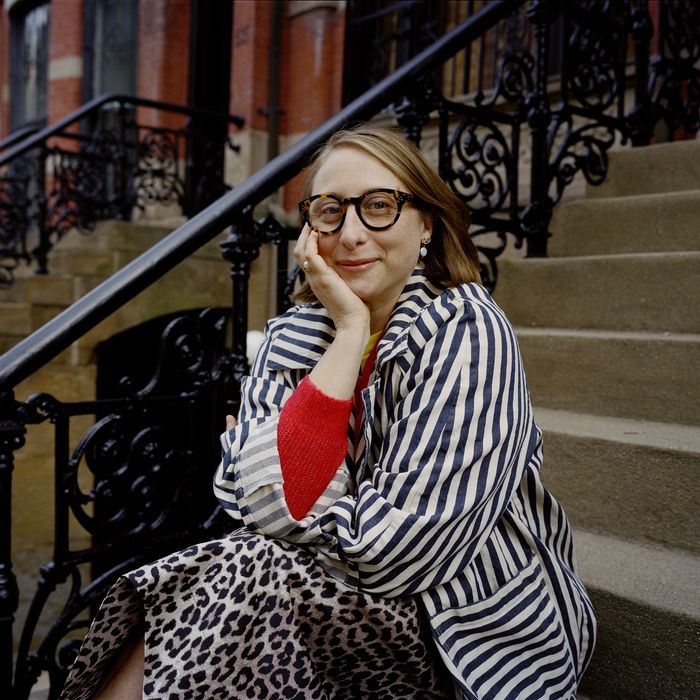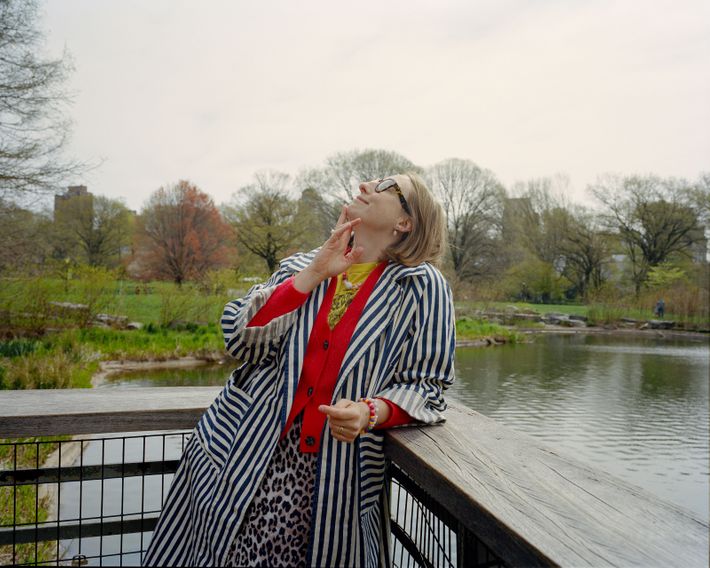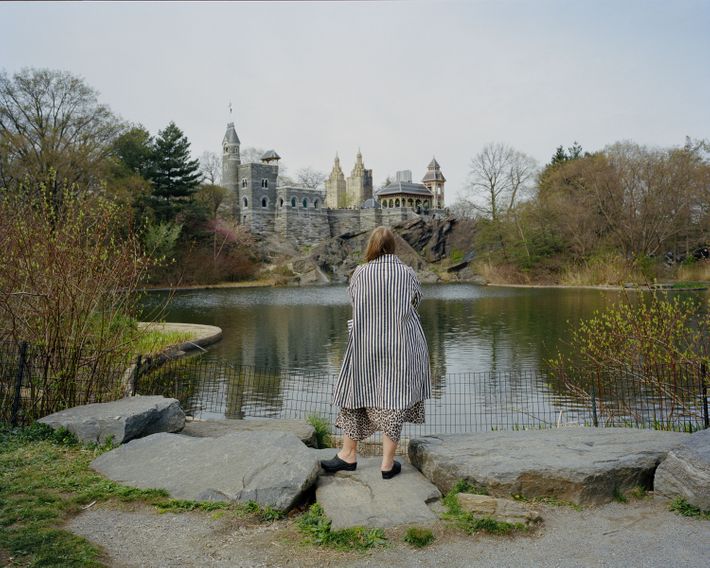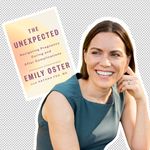
By the time I meet Emma Straub outside the American Museum of Natural History, it’s a few minutes past 10 a.m. and the author and bookstore owner has already traveled to her youth and back.
“I just had the weirdest experience!” she says immediately, looking slightly dazed. I expect her to describe an unnerving sidewalk encounter. I do not expect her to say she’s spent the past two hours sobbing in various rooms of her childhood home. Those two hours before our scheduled rendezvous on the museum steps had been reserved for the photo shoot that would accompany this profile. The idea was she’d meet the photographer, Sara Messinger, on the stoop of 53 West 85th Street because This Time Tomorrow— Straub’s new novel, out May 17, which we’re here to discuss — takes place almost entirely around her teenage stomping grounds. A few snaps into the shoot, Straub breathlessly explains, a black Escalade slid up to the house, and a man dressed in head-to-toe white emerged from the car. He asked if Straub was there to see the house — he was a real-estate broker, and this was his listing. She wasn’t, but could she go inside anyway, at least until the would-be buyer arrived? The broker unlocked the front door, and Straub “immediately burst into tears,” she says. She wandered through the tastefully staged rooms, all beige, turning the lights on and recounting to the patient photographer how much the house had changed since her parents moved out in November 2015. Later, in her Substack, she’d describe the experience as “time travel in one easy step.”
As she recounts her emotional morning, I try not to panic over the fact that the centerpiece of our interview happened before I showed up. I’m hoping for another kooky, cosmic coincidence I can observe with my own two eyes, but this one’s a real whopper. I know we’re unlikely to top it. I keep picturing the email exchange with Straub’s publicist as we thrice rescheduled. If Straub and I had met on March 25 or April 11 or April 20, we would not have this Monday-morning Twilight Zone episode on our hands.
“It did feel a little on the nose,” Straub says, considering that This Time Tomorrow follows a woman who, on her 40th birthday, unexpectedly travels back to 1996, via portal, to her childhood home on the Upper West Side.
It may come as a surprise that Straub — a writer known for sunny, insightful book-club hits — tackled time travel, a motif often reserved for sci-fi writers. (Straub’s previous books are domestic comedies featuring ensemble casts; her 2020 novel All Adults Here is being adapted for television by Girls writer Sarah Heyward.) She wrestled with the challenge, worried that sci-fi authors might say she had no business riffing on their plot device (a pet peeve of her father, horror writer Peter Straub). So she studied up on time-travel novels such as Octavia Butler’s Kindred and Jack Finney’s Time and Again. And because she still wanted guidance, she emailed one of her father’s best friends, a professor and critic who studies genre conventions. “I asked him, ‘How do I do this well? How do I do this in a way where genre writers don’t hate me?’” she recalls. “He said, ‘Time travel is something that belongs to all of us. It’s so much a part of our collective imagination that it doesn’t just belong to sci-fi anymore.’” His one piece of advice: She must follow the rules of her world, but the rules were hers to make.
The resulting novel reads like a ’90s-flavored after-school special for adults — think 13 Going on 30 meets Back to the Future. It’s a delight.
Originally, we had planned to stroll around the various settings of the book, which also happen to be the settings of her adolescence: the dreamy Pomander Walk, the whale room inside the Museum of Natural History, Gray’s Papaya. In other words, we were going to time travel, but that already happened without me. So instead, we decide on lunch at French Roast, a reliable bistro that Straub’s fellow cohort of teenagers “didn’t trust” when it opened in 1995 because it seemed “new, glossy, and for adults.” When she says this, she is somehow 41 and 16 at the same time; Straub has the disposition of your favorite high-school art teacher, or the one you wish you had. It is nearly impossible to picture her taking a drag on a Newport Light, and yet, Straub says, she was a “great smoker” as a teenager.
We order ice teas, French onion soup (Straub) and a mushroom omelet and fries (myself). After our server walks away, Straub points out, somewhat conspiratorially, that she was wearing a 1994 nameplate necklace.
“A little on the nose,” I say.
As high-school sophomores, Straub and her friends mostly frequented 3 Star Coffee Shop, a now-shuttered diner on the corner of 86th and Columbus. The idea of adolescence in Kids-era New York now occupies a particular niche in our cultural lexicon; even the visual language of Friends and Seinfeld evokes a similar sort of serendipity. Straub says it was all of that and more.
“You would make a plan in advance on the telephone,” she says, as if describing something completely unheard of today (which, to be fair, it is). “And then you would go and meet your friends there. You’d gather people up like a tornado until you were roaming around the streets with 15 teenagers going from house to house and diner to diner.” But what happened if you and the group kept missing each other? “There were beepers,” she says. “There were a few pay phones that were pretty reliable, where you would page someone and then they would call back the pay phone. And you could make the plan that way.”
These days, I say, talking on the phone has become too much of an event. What ever happened to impromptu phone calls?
Straub agrees. “The only people who do this with me are women who are a little bit older than I am,” like fellow writers Taffy Brodesser-Akner, Meg Wolitzer, and Ann Patchett, she says. “They just pick up the phone and call. It’s the best. I love it. I could talk on the phone for three hours every day and be completely happy.” The idea of talking on the phone conjures memories of her canopy bed and River Phoenix pinups. “You’d talk for hours, and then you’d hang up and have dinner, watch Beverly Hills 90210. And then you’d call back.” If she could call up that 16-year-old Emma now, she says, she would tell that version of herself to have “four hundred times the amount of self-confidence” she had. “I always thought of myself as this plain, boring, best friend in my own life,” Straub says. “And I was a confident kid! I was close with my parents, I had friends, and even so, I just feel sorry for my little self.”
The paradox of aging, Straub says, is “you never realize how young you were at the time. I have to remind myself that I am younger now than I will ever be again. My skin is as good as it’s ever going to be.” But as an adult, she can engage with young people and create spaces for their empowerment. That’s why she became a marquee freelance contributor to Rookie magazine at 31, covering such topics as Betsey Johnson, the importance of saying “yes,” and the truth about writing fiction about real people. “Writing for Rookie and being part of that community and opening Books Are Magic and having a community of young booksellers have been the two most formative experiences of my adult life,” she says, “in terms of the way I see the world and in terms of the way I understand myself and my own position.”
After stints as an editorial assistant in publishing, a personal assistant to Stephin Merritt (and later merch girl for his band the Magnetic Fields), a bookseller at BookCourt, a writing instructor, and a full-time novelist, she and her husband, Michael Fusco-Straub, created Books Are Magic in Cobble Hill in 2017. When it opened, Straub says, the couple wanted to bring an indie bookstore to their neighborhood since they’re “the best kind of natural gathering places,” she says. The original business plan was “break even,” but the store has been profitable, and “the fact that we can give our employees raises and bonuses and really try to be good is incredible,” she says.
The airy, skylit space boasts an impressive slate of book launches and community events, and Straub has become a local celebrity. A handful of Books Are Magic alumni have written books or work in publishing, some thanks to Straub’s referrals. Michael Chin, the former events director, is about to query agents with his first novel. “I have been writing love letters to all the coolest agents I know about him,” Straub says, while former kids’ manager Abby Partello now works as best-selling author Casey McQuiston’s assistant. It’s fitting that Alice, the protagonist of This Time Tomorrow, is a beloved admissions counselor at a New York private school; as one of literary Brooklyn’s most visible ambassadors, she plays a similar role in the publishing industry.
Much of This Time Tomorrow is an exercise in wish fulfillment. Alice spends most of the book ping-ponging between her 40th birthday and her 16th birthday, a setup that allows her to spend time with her ailing father, Leonard, when he himself was in his 40s. With a 40-year-old brain in a 16-year-old body, Alice can appreciate her father’s personality and vitality in a different light.
Straub spent four months of 2020 making weekly hospital visits to her own father, who was sick with various heart problems. “We all thought he was going to die,” she says. (In hindsight, she has no idea why the hospital let her in since these were the terrifying months before the vaccine rollout.) During that time, she hit the brakes on a “silly” book that no longer felt relevant to her new reality of homeschooling two boys, ages 6 and 8, at the kitchen table while her husband shipped out Books Are Magic orders. Straub’s physical world had contracted to a walkable radius in Cobble Hill plus the hospital. Once she had child care again, what could she write about? Her father jokingly suggested she produce a book about “a woman who visits her dad in the hospital,” and when she handed him a finished manuscript less than a year later, she says he asked, “What page do I die on?”
Despite her team’s pronouncements that This Time Tomorrow is her “most autobiographical novel yet,” Straub is not Alice. Her father is not Leonard. But the narrative does tap into the emotional questions of their relationship. “My dad and I have always had this very funny relationship. We talk to each other like adults who are trying to impress each other at a dinner party, and we get so much pleasure out of that,” she says. “This is by far the most sincere thing that I’ve ever said to him.” Straub feels lucky that her father understands how real life translates to fiction; many writers’ parents do not. Growing up, she says, “art was a place to process things” in her family. (Straub’s mother, Susan, directed a children’s-literacy program for 20 years.) “You could use art as a safe place to explore things and help process them.” Throughout her childhood, she saw her father reckon with trauma by channeling it into his horror novels. “It allows him to go to really dark places in a way that still keeps him safe,” she says. “So I knew this book would be okay with him.”
Though some parents might blanche at speculative fiction covering their demise, Peter Straub was game. In an email, he says he was “intensely curious” and “instinctively pleased” about the project, though he had some concerns about how Emma’s audience would receive a time-travel book. Still, he was “astounded” she carved out the headspace to produce a new book “with two small, noisy boys, a terrific husband, a household, a lively Brooklyn bookstore, frequent civic and literary duties and obligations, about fifty or sixty intimate and demanding friends, and a father apparently waving bye-bye through a bus window.” This is all very sweet and very dad, but Straub assures me that she hunkered down with the manuscript the minute she could and that the past two years completely changed her relationship to time, work, and attention.
“All of these things that felt concrete no longer do,” she adds. “It’s always true that whatever book you write is a book that you couldn’t have written before and one that only you could write.”
Soon after her father read the manuscript, the comedian Albert Brooks staged his own funeral and attended it via surveillance camera on the 11th season of Curb Your Enthusiasm. “My dad was like, ‘I’d like to have that,’” Straub says. “I said, “Dad, it’s 350 pages — it’s right here!’”
“Well,” the elder Straub reportedly replied, “I want to know what the poets will say.”
Confronting the inevitability of her father’s death became a thought experiment that Straub calls “a strange part of getting older that people don’t talk about very much.” Preparing oneself to lose loved ones is intense, she says, “and it’s really changed my relationship to my parents.”
The check arrives, and it’s safe to say we’re not going to cause another space-time ripple before she heads back to Brooklyn. There is a girl sitting nearby with a coral backpack embroidered “Astrid” — Astrid Strick is a prominent character in All Adults Here — but that one’s a consolation coincidence, nothing more than frequency bias.
Assuming she hasn’t already, would she ever want to transcend time and space herself? Probably not. “It seems stressful,” she says. “I wouldn’t want to …” She pauses, nods, changes her mind. “No, I would want to do it. Maybe for a day.”






